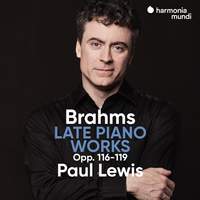Recording of the Week,
Paul Lewis plays Brahms
With their focus on introspection, isolation and contemplation of one’s own mortality, it’s little wonder that the handful of compositions which Brahms produced towards the end of his life in the 1890s have resonated with so many artists over the past two years. The long periods of lockdown have yielded a lavish crop of fine recordings of the sonatas for clarinet/viola and piano from artists including Michael Collins and Stephen Hough, Antoine Tamestit and Cédric Tiberghien, and Philip Dukes and Peter Donohoe, whilst Hough’s accounts of the final four sets of solo piano works (released this time last year on Hyperion) emerged as one of the jewels in that artist’s richly-studded crown.
Today Paul Lewis enters the conversation, with a programme identical to Hough’s, and whilst it almost goes without saying that the British pianist need fear no comparisons with his slightly older contemporary in terms of either poetic insight or sheer technical accomplishment, it’s fascinating to hear the subtle but distinct differences in their perspectives on this music. If Hough’s recital offers a compelling Portrait of the Artist as an Old Man and frequently emphasises the music’s Classical pedigree, Lewis leans into the moments of startling modernity in many of these pieces: I don’t think I’ve ever been quite so aware that these works were written at the fin de siècle, or of the kinship between late Brahms and early Debussy (a composer with whom Lewis spent a lot of time during lockdown, as he mentioned in our interview in 2020).
 The contrast between the two approaches announces itself from the outset: in Hough’s hands, the opening Capriccio in D minor Op. 116 emerges as ‘high and solitary and most stern’, whereas Lewis (recorded in a more resonant acoustic and making slightly more liberal use of the pedal) offers something more extrovert and expansive, with lashings of immaculately-judged rubato and plenty of emphasis on the music’s rhythmic unpredictability. This is an interpretation which looks forward to Rachmaninov quite as often as it glances back to late Beethoven; Hough’s abiding mental image is of ‘the bearded pianist sitting alone at the piano’, and whilst Lewis may well share that perspective there’s the impression that he’s doing so in the concert-hall rather than a private setting, and with the expectation of a virtual audience if not a physical one.
The contrast between the two approaches announces itself from the outset: in Hough’s hands, the opening Capriccio in D minor Op. 116 emerges as ‘high and solitary and most stern’, whereas Lewis (recorded in a more resonant acoustic and making slightly more liberal use of the pedal) offers something more extrovert and expansive, with lashings of immaculately-judged rubato and plenty of emphasis on the music’s rhythmic unpredictability. This is an interpretation which looks forward to Rachmaninov quite as often as it glances back to late Beethoven; Hough’s abiding mental image is of ‘the bearded pianist sitting alone at the piano’, and whilst Lewis may well share that perspective there’s the impression that he’s doing so in the concert-hall rather than a private setting, and with the expectation of a virtual audience if not a physical one.
That’s not to say that Lewis isn’t entirely attuned to the introspective poetry of this music: there’s plenty of that on offer in the ensuing Intermezzo in A minor (where the beautiful veiled quality which he draws from the treble register almost suggests that he’s switched to a different piano), and in the tender lullaby-like opening of the Op. 117 set, where the gentle momentum and singing bass-lines work a special magic. The Op. 119 pieces, too, bring many quiet revelations – not least the melancholy grace of the opening broken-backed waltz, where Brahms noted to Clara Schumann that ‘every bar and every note must feel like a ritardando’ and Lewis takes him at his word.
But what throws these passages into such striking relief is Lewis’s willingness to play up the moments of no-holds-barred drama elsewhere, such as the final stretches of the Capriccio Op. 116 No. 7, where the gloves really come off and the last twenty seconds seem to anticipate (of all things) Tosca’s frenzied cries to Scarpia as Cavaradossi suffers in his torture-chamber less than a decade later. It’s just one of many instances where Lewis highlights the forward-looking qualities of these late works; in the third and fourth pieces in the Op. 116 set, for example, he dwells on dissonances which rival recordings often gloss over, and gently emphasises the richness and strangeness of Brahms’s many modulations into unexpected harmonic territory. The music often feels as if it’s being improvised there and then, with the performer revelling in the scenic route back to the home key and taking his sweet time over the journey.
Even if you’ve already invested in Hough’s masterly set from last January, Lewis’s alternative take on these works is more than worth your time – and if you’re simply looking for a library copy of this music, I can think of few finer choices.
Paul Lewis (piano)
Available Formats: CD, MP3, FLAC, Hi-Res FLAC



